|
Answering Arguments Against Animal Rights |
| Part XVII -- Argument Twelve: There is no such thing as animal rights |
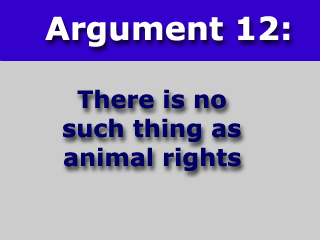
Argument twelve: there is no such thing as animal rights.
|
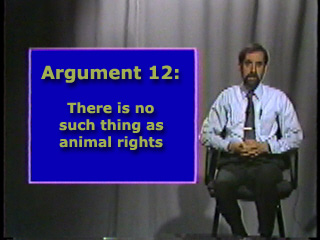
This argument is an old one -- resurrected recently by Rush Limbaugh in his
book (ironically entitled The Way Things Ought to be). It goes like this:
there is no such thing as animal rights because rights imply a contract
between two parties, and animals cannot enter into contracts with us.
What is meant by a "contract" here is a set of rules that people agree to
abide by.
|

For example: I agree that I won't ransack my neighbor's house when he's away,
and he agrees to refrain from ransacking my house when I'm away.
Such contracts are usually understood without being explicitly agreed to.
It is claimed that because non-human animals cannot make such contracts (and
cannot in fact be expected to resist any temptation) they cannot enter into
a moral contract.
Since we only need to act morally towards those who can reciprocate,
non-human animals are excluded from moral consideration. In short: because
they are not moral we have no moral obligations towards them.
|

There are a lot of things wrong with this argument.
First of all, it's a very poor philosophy of life. If I only need to act
morally to those who have a tacit agreement to return the favor, what
prevents me from acting in any manner I see fit to someone outside this contract?
|

What prevents me from ransacking a house in a different neighborhood
where I am unknown and will never be seen again?
|

Or what prevents us from conducting painful medical experiments on criminals
who have violated the contract?
|

An example of this so-called morality can be seen in Apartheid in South Africa,
where the only ones allowed to enter into the moral contract were White.
Since the Whites had all the power, and the Blacks were kept outside of the moral contract,
great injustices were perpetrated on them.
|

It is also plain to see that infants and the severely mentally handicapped
cannot enter into a moral contract. They have no concept of justice or
rights, and are not responsible for their actions. Yet, they have rights,
and it would be immoral for us to use or abuse them in any way we saw fit.
If this theory of rights based on contracts leads to immoral consequences
with people, we cannot use it as a moral basis for dealing with animals.
|

In fact, we have no use for it at all, and need to throw the whole idea out and
find some better system of ethics.
Morality does not consist of simply entering into a contract to refrain from
causing harm to others so that they will refrain from harming you.
|

Though such a contract may be wise when dealing with hostile people,
it has nothing to do with morality.
|
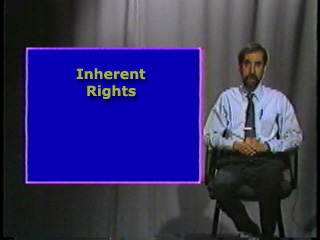
My neighbor has an inherent right not to be robbed or harassed simply because
he is a sentient being with an interest in living his life unmolested by me.
True morality comes from recognizing this inherent right in all sentient beings,
and from empathizing with them.
This "inherent rights philosophy" guarantees an end to discrimination on the
basis of race, sex, and religion, as well as on the basis of species. It is
thus morally superior to the concept of morality based on a contract.
|
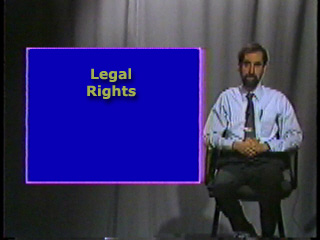
Another argument sometimes advanced to deny that non-human animals have rights
is that the only rights that exist are legal rights. To quote Rush Limbaugh:
Our laws do not prevent us from killing for food or for sport.
So the right to life of an animal is nonexistent.
|
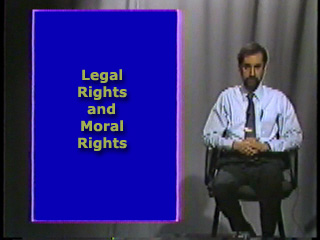
This view denies that there is such a thing as a moral right.
Its practical application means that, for instance...
|
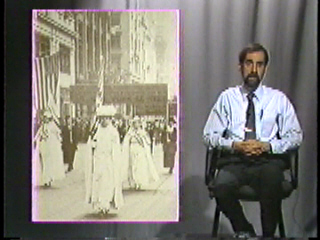
...before Blacks and women were allowed to vote, they had no moral right
to participate in the governing of their lives. Since they had no moral
right to vote, it was in no sense "wrong" to prohibit them from voting.
But, once the constitution was amended, they suddenly had a right to vote,
and it was suddenly wrong to prohibit them from voting.
|

Right and wrong do not change from one day to the next based on the vote
of men. Legal rights are but an imperfect reflection of the moral rights
which have always existed but have not always been acknowledged.
If there were no such thing as a moral right, where did the idea
come from that Blacks and women should be given the right to vote?
Unless someone recognized that there was a moral right being denied to
them, the process of amending the constitution and creating a legal
right would never have crossed anyone's mind. Without moral rights we
would have no reason to create laws to protect these rights.
|